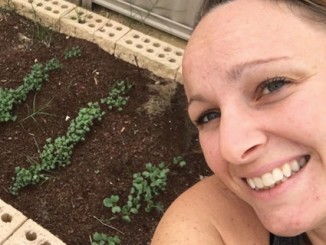“Come quickly!” My wife called out from our tiny front garden in Petersham. Expecting the worst I bolted down the hall. “Blue bandits! Look!” she says. But what she really meant to say was “Blue Banded Bees”.
Over the last two years the garden has been filling with native plants from the local council nursery, where Rosa volunteers each week, and her excitement was about successfully attracting native bees to pollinate flourishing tiny blue flowers, which I now recognise as commelina. Two days later, another delight. A large, ginger, furry bee with back leg pollen sacks bulging lumbered from flower to flower. We’d spotted a ‘Teddy Bear Bee’.
Bees and beekeeping have become a rewarding hobby. Some years back, Michael Mobbs, author of The Sustainable House invited us to his Chippendale home to witness the splitting of a native bee hive by Peter Clarke from Kuringai Council. Hundreds of tiny black stingless bees (tetragonula carbonaria), smaller than flies, came pouring into our life.
Peter’s brief was to install the little hives in private gardens across his municipality for pollination, as European honey bee numbers were in decline. I volunteered to help him and now am tackling a similar task for the Marrickville Council and Primary School Garden Learning Centres. Seventeen hives have been installed since 2011.
The day my first hive went on display at the Addison Road Native Plant Nursery I emailed friends with a photo. Two responded saying they had “Big Boy’s Bee Hives” and welcomed my help. WIRES had installed possum boxes high in trees at Summer Hill, Balmain and Callan Park. Honey bees had taken over and were flourishing. I quickly learned how to handle these amazing creatures and started studying everything I
could about them.
Our relationship with bees is truly ancient on every continent. We have developed total dependency on this insect for much of the food that we eat. They are worth billions.
We have also developed toxins aimed at protecting our crops which now threaten the future of these industrious friends. Increasing world temperatures, droughts and floods have added to their decline. Bees are suffering from mites and disease from widespread monoculture farming. However, scientists are working feverishly to help, and, thankfully, the message is spreading. A growing number of groups are developing worldwide to bring back bee numbers.
Known as “beeks,” beekeepers who trawl the online world for the latest research are putting hives in places never before thought possible. I confess that I too am now officially a beek with hives in gardens, on roofs and balconies from Maroubra to Turramurra. I even display a hive at the Easter Show and give talks and demonstrations on native and honey beekeeping. If you’re interested in getting involved, we meet monthly at the Sydney Bee Club in Darlinghurst. For more info visit sydneybeeclub.org.au.
Words: Gavin Smith, member of the Addison Road Community Garden.


Leave a Reply
You must be logged in to post a comment.